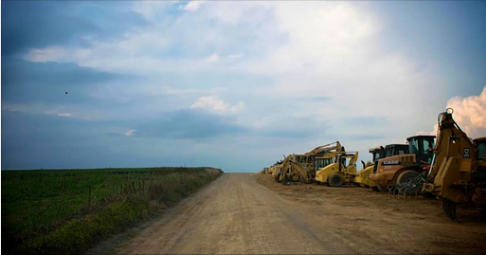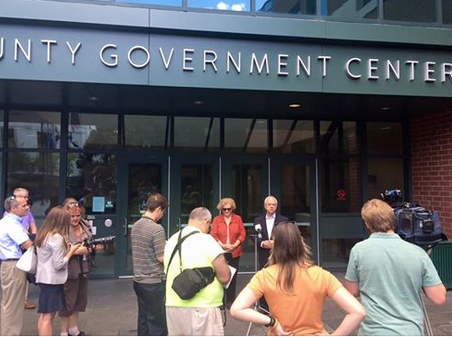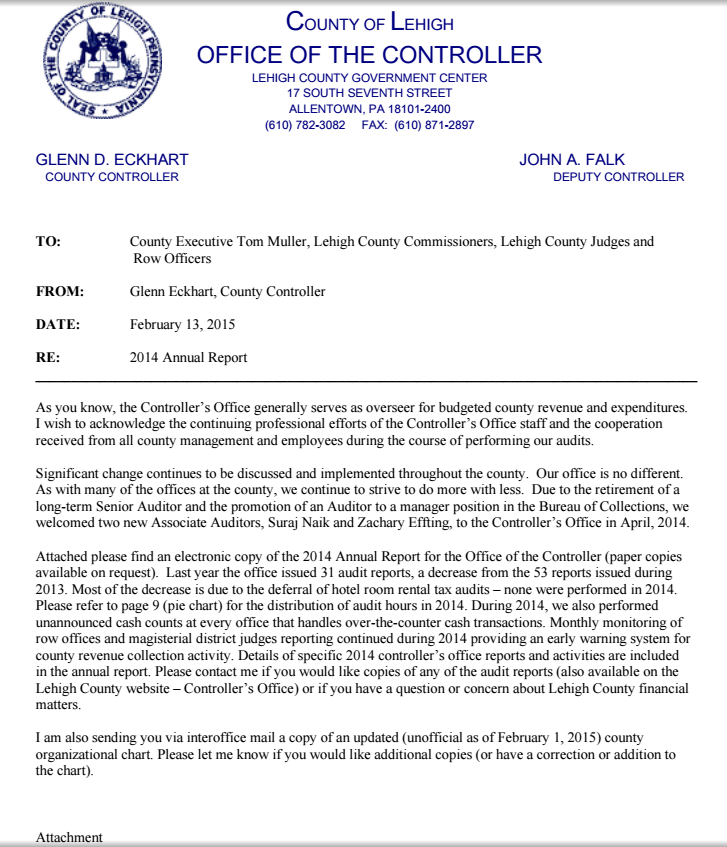A question was posed to Republican County Commissioner candidates about funding Farmland Preservation initiatives at a recent Young Republicans debate. Attending were all 5 (R) candidates for Lehigh County Commissioner. When it comes time for the general election RenewLV will pose the same question to all candidates again including Democrats.
Backgrounder: The County in the past has allocated funds to the farmland preservation fund ranging from 2M annually from 2006-2010 to a low of 0 in 2011. In 2015 the county allocated 250,000. When the County allocates money it receives $2.50 cents in commonwealth funding for every dollar.
My thoughts: Downzoning farmland is an unfair taking of property value therefore compensating landowners market value for development rights is the only fair and free market way to preserve farmland forever. Second, it’s a fact that preservation reduces local and state municipal obligations to provide services and infrastructure related to sprawl. For every dollar we spend to preserve farmland that is zoned suburban it saves us .15 to .50 cents on each one of those dollars down the road. This figure is even higher if we leverage our dollars with state and county.
For me, this is one of the most important issues as a voter. Preserving farmland is a key component in Lower Macungie’s strategy to keep taxes sustainably low over the long term. Learn more: Want to keep taxes low? Preserve farmland.
The question was posed “Would you support restoring funding of the County Farmland preservation program to previous levels” here are the answers paraphrased:
Marty Nothstein: “I’m a conservationist” “I own preserved farmland” “Development is important but so is preserving our countryside””We need to look at more ways to preserve farms””We need to do a better job of finding strategic ways to preserve including partnering with townships” “We need to do a better job of finding money…” “When you have farmers that want to see their land protected forever, I think that’s important to residents of Lehigh County”
My thoughts: Marty was most aggressively positive in his answer. It’s very clear he is very much in favor of preserving farmland and even has done so himself. Based on this answer and conversations I’ve had with him it’s clear he would be a champion of funding the program as a Commissioner.
Amanda Holt: “Our natural resources our important and it’s something that’s talked about in the Pennsylvania Constitution.” “Important issue but I’m concerned the average age of farmers is now 57 here in Lehigh County. Looking at the cost I wonder if this is going to be an effective means of really preserving the farmland looking at the average age of farmers. This is something we really need to take look at. We do need to consider moving forward how we can adhere to what the state constitution says and what works best for our situation here in Lehigh County.”
My thoughts: Very good answer. Very impressed Amanda Holt referred to the state constitution. She is absolutely correct to do so. The state constitution in Article 1 section 27 says: “The people have a right to clean air, pure water, and to the preservation of the natural, scenic, historic and esthetic values of the environment. Pennsylvania’s public natural resources are the common property of all the people, including generations yet to come. As trustee of these resources, the Commonwealth shall conserve and maintain them for the benefit of all.”
Amanda also was the only one to refer this last years funding. She correctly stated that the County funded 250,000. This led to a state match of 750,000.
Brad Osborne: “I do know that farmland preservation has been promoted as a good program. The Green Futures Fund generated $20 million. It ended. Can we revive it? Farmland absorbs only .33 cents of every tax dollar generated whereas residential requires over a dollar” “Specific requests need to be in line with the bigger picture. A larger plan is needed.” “Property tax reform could change the entire question.” We need to evaluate this further.
My thoughts: As usual Brad was prepared to give a very thoughtful answer. I was impressed he was ready with the statistics demonstrating the long term tax value of preserving farmland. As I write often on this blog, farmland is the best way to keep our taxes sustainably low over the long term. I would have loved a more aggressively positive answer, but I respect that Brad doesn’t put his opinion out there before he completely understands an issue.
Vic Mazzioti: “There are 3 ways we’ve funded preservation in the past. First, through tax dollars. Another was the sale of assets and we received grants from the state.” “I’m for continuing the program. But if we do it with general tax dollars that requires further discussion.” “Meantime I think we should continue funding the program through the other two sources I mentioned. 1. Any assets that we sell. 2. Grants that we receive that permit us to use those funds for farmland preservation.”
My thoughts: Vic, gave another well thought out answer.
Dean Browning: “The program from early 2000 generated $30 million and we did not need to borrow. We funded it out of revenue. I was Chairman of the Sterling Raeburn Farmland Preservation Committee. I see the benefit of the program, however I am reluctant to continue it absent any specific vote by the taxpayers saying they want the program re-instituted and number 2 identifying a specific funding source for it”
My thoughts: I was disappointed by this answer. This could have been a way to really differentiate himself to voters in Lower Mac who by and large support open space preservation and understand how an investment today will keep taxes sustainably lower over the long term.
![]() 𝐅𝐮𝐥𝐥𝐲 𝐟𝐮𝐧𝐝𝐞𝐝 𝐋𝐞𝐡𝐢𝐠𝐡 𝐂𝐨. 𝐅𝐚𝐫𝐦𝐥𝐚𝐧𝐝 𝐩𝐫𝐞𝐬𝐞𝐫𝐯𝐚𝐭𝐢𝐨𝐧 𝐩𝐫𝐨𝐠𝐫𝐚𝐦: This past year we’re on track (some farms are still in the process of settling) to preserve 12 new farms totaling 650 acres. This included the first preserved farm in Whitehall Township.
𝐅𝐮𝐥𝐥𝐲 𝐟𝐮𝐧𝐝𝐞𝐝 𝐋𝐞𝐡𝐢𝐠𝐡 𝐂𝐨. 𝐅𝐚𝐫𝐦𝐥𝐚𝐧𝐝 𝐩𝐫𝐞𝐬𝐞𝐫𝐯𝐚𝐭𝐢𝐨𝐧 𝐩𝐫𝐨𝐠𝐫𝐚𝐦: This past year we’re on track (some farms are still in the process of settling) to preserve 12 new farms totaling 650 acres. This included the first preserved farm in Whitehall Township.![]() 𝐏𝐮𝐛𝐥𝐢𝐜 𝐒𝐚𝐟𝐞𝐭𝐲: We passed a bond supporting an upgraded digital radio system for first responders. Changing what is now an analog radio system to a completely digital one.
𝐏𝐮𝐛𝐥𝐢𝐜 𝐒𝐚𝐟𝐞𝐭𝐲: We passed a bond supporting an upgraded digital radio system for first responders. Changing what is now an analog radio system to a completely digital one.![]() 𝐓𝐚𝐱 𝐂𝐫𝐞𝐝𝐢𝐭𝐬 𝐟𝐨𝐫 𝐅𝐢𝐫𝐬𝐭 𝐑𝐞𝐬𝐩𝐨𝐧𝐝𝐞𝐫𝐬: We established a County Real Estate Tax Credit for Active Lehigh County Volunteer Firefighters residing in LC. As of a few days ago 168 Lehigh Co. Firefighters are taking advantage of this program. Commissioner Pineda and I were co-sponsors. Pineda did alot of the legwork to get this going.
𝐓𝐚𝐱 𝐂𝐫𝐞𝐝𝐢𝐭𝐬 𝐟𝐨𝐫 𝐅𝐢𝐫𝐬𝐭 𝐑𝐞𝐬𝐩𝐨𝐧𝐝𝐞𝐫𝐬: We established a County Real Estate Tax Credit for Active Lehigh County Volunteer Firefighters residing in LC. As of a few days ago 168 Lehigh Co. Firefighters are taking advantage of this program. Commissioner Pineda and I were co-sponsors. Pineda did alot of the legwork to get this going.![]() 𝐑𝐞𝐝𝐞𝐯𝐞𝐥𝐨𝐩𝐦𝐞𝐧𝐭: We reconstituted Lehigh County Redevelopment Authority.
𝐑𝐞𝐝𝐞𝐯𝐞𝐥𝐨𝐩𝐦𝐞𝐧𝐭: We reconstituted Lehigh County Redevelopment Authority.![]() 𝐋𝐞𝐡𝐢𝐠𝐡 𝐂𝐨𝐮𝐧𝐭𝐲 𝐉𝐚𝐢𝐥: We established the Stepping UP Initiative to Reduce the Number of People with Mental Illnesses in Lehigh Co. Jail. And also expanded GED and other education opportunities in LCJ. Special thanks to outgoing Commissioner Bob Elbich for his work on the Stepping Up Program.
𝐋𝐞𝐡𝐢𝐠𝐡 𝐂𝐨𝐮𝐧𝐭𝐲 𝐉𝐚𝐢𝐥: We established the Stepping UP Initiative to Reduce the Number of People with Mental Illnesses in Lehigh Co. Jail. And also expanded GED and other education opportunities in LCJ. Special thanks to outgoing Commissioner Bob Elbich for his work on the Stepping Up Program.![]() 𝐓𝐚𝐤𝐢𝐧𝐠 𝐜𝐚𝐫𝐞 𝐨𝐟 𝐂𝐨𝐮𝐧𝐭𝐲 𝐄𝐦𝐩𝐥𝐨𝐲𝐞𝐞𝐬: We enacted temporary Wage Increases for 24/7 operations.
𝐓𝐚𝐤𝐢𝐧𝐠 𝐜𝐚𝐫𝐞 𝐨𝐟 𝐂𝐨𝐮𝐧𝐭𝐲 𝐄𝐦𝐩𝐥𝐨𝐲𝐞𝐞𝐬: We enacted temporary Wage Increases for 24/7 operations.![]() 𝐑𝐞𝐠𝐢𝐨𝐧𝐚𝐥 𝐋𝐚𝐧𝐝 𝐔𝐬𝐞 𝐏𝐥𝐚𝐧𝐧𝐢𝐧𝐠: We moved forward funding of a regional planning initiative for the northwest tier communities. This is an item I am sponsoring.
𝐑𝐞𝐠𝐢𝐨𝐧𝐚𝐥 𝐋𝐚𝐧𝐝 𝐔𝐬𝐞 𝐏𝐥𝐚𝐧𝐧𝐢𝐧𝐠: We moved forward funding of a regional planning initiative for the northwest tier communities. This is an item I am sponsoring.![]() 𝐑𝐞𝐜𝐫𝐞𝐚𝐭𝐢𝐨𝐧: Announced the D&L Trail and River Drive Multimodal Corridor. (Lehigh County will maintain trails associated with the project)
𝐑𝐞𝐜𝐫𝐞𝐚𝐭𝐢𝐨𝐧: Announced the D&L Trail and River Drive Multimodal Corridor. (Lehigh County will maintain trails associated with the project)






